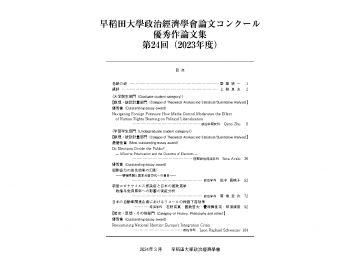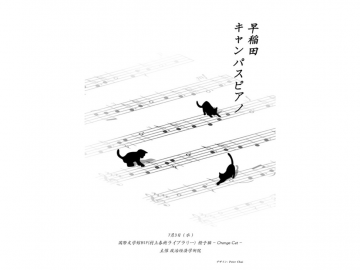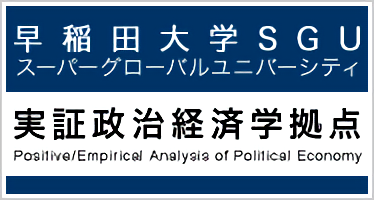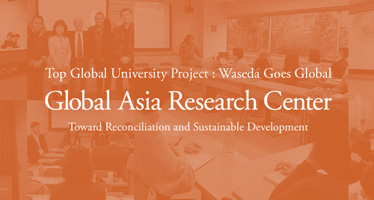I would like to start by warmly congratulating you on joining the Japanese-based degree program at the School of Political Science and Economics at Waseda University.
On April 1, 738 students officially entered our School. Specifically, 282 students will study in the Department of Political Science, 316 students in the Department of Economics, and 140 students in the Department of Global Political Economy. Together with 75 students who joined the English-based degree program last September, the School now has a total of 813 freshmen.
It is, of course, most unfortunate that we are unable to go ahead with our planned entrance ceremony, and all our faculty and staff are truly sorry that we are unable to celebrate together this important milestone in your life—one that marks the start of your college life. When we consider how disappointed you, your family, and all those who have looked forward for so long to this event must feel, we are heartbroken. Nonetheless, the fact that you are now enrolled at the School of Political Science and Economics at Waseda University stands undiminished as a shining testament to your hard work and perseverance.
While I am delighted to pay tribute to your fine achievements, I am also conscious that success is usually predicated on the nurture and support of those around us. Never forget that although you are the ones who made the effort, that effort was made possible by those around you—your family, your friends, your mentors, and others. To paraphrase what someone once said, “No person is an island.”
I would therefore like to take this opportunity to address the families, relatives, friends, and all others who have supported our new students physically, mentally, and with such affection. I offer you, too, my congratulations. Our new students are Waseda students in no small part thanks to your support. Of course, matriculation is just the starting point of their higher education. Their university days will be a transitional period to life in society after graduation. That is why this time constitutes an important formative stage in life. I hope you will continue to take care of our students wholeheartedly—and, yes, sometimes strictly!—so they will fulfill their potential and become independent and autonomous members of society.
As you may know, Tokyo Senmon Gakko, which went on to become Waseda University, was founded in 1882. Shigenobu Okuma, who had retired to private life as a result of political changes the previous year, fervently believed that higher education was essential to the formation of a truly modern nation, and he opened Tokyo Senmon Gakko to realize his dream of developing the leaders that Japan needed. The Department of Politics and Economics, the predecessor of the School of Political Science and Economics, was established at this time and has played a seminal role in the University’s history.
Shigenobu Okuma’s ideals are embodied in the mission of Waseda University: the independence and practical application of scholarship, and the development of good citizens. Okuma said that there must be grand ideals underpinning the provision of a fine university education. “Japan now stands at the crossroads of East and West,” he said. “Our greatest ideal is to establish harmony between the eastern civilization and the sophisticated western civilization as a mediator between them….To realize this ideal, whatever it takes, Waseda University devotes itself to original research, holding the independence of scholarship and the practical application of scholarship as central principles and applying the results to the real world. Therefore, those who aspire to achieve the mission must respect individuality, develop themselves and their families, benefit the nation and society, be active in the world at large, and be people of character who are capable of fulfilling their mission. They then deserve to be called good citizens. Therefore, if you want to be good citizens, knowledge alone is not enough. You must have moral character. We must not only serve ourselves, our family, and our country, but also aspire to serve the world.”
Okuma was a statesman who valued education. This was an invaluable blessing for Waseda University and for Japan. He founded Waseda University to develop global citizens who could take the initiative as leaders, using the knowledge they gain through their studies. This aspiration has been a tradition for 138 years and continues to embrace us even as we gather here today. You who enter Waseda will be educated in this tradition and will then scatter to make this dream become a reality. Students at the School of Political Science and Economics are expected to be able to propose insightful and innovative visions. Such a capacity has never been more important than it is today. Graduates of the School of Political Science and Economics must become leaders who can find alternative solutions in any area of society. Today’s leaders must not only play a traditional leading role, but also navigate through a world of diverse values. Modern leaders must be able to listen carefully to others and show compassion to those in difficulty around them. In such a sense, the School of Political Science and Economics has been creating history for 138 years as a faculty that rises to this challenge.
At this point, let me introduce you to someone. Do you happen to be familiar with the name of Toyokichi Ienaga, an intellectual who figured prominently in the early history of modern Japan? Like Kan’ichi Asakawa, he devoted his energy to intellectual exchange between Japan and the United States. He was probably the first Japanese person to complete a PhD in Politics at an American university. Although the United States is often regarded today as the global leader in higher education, young Americans of the 19th century often chose to study at venerable European universities. This was because American higher education was younger and more modest back then. The reorganization of higher education in the USA did not start until the 1870s, after the Civil War. Graduate schools were founded, and PhD courses and law schools developed. After studying at Doshisha University, Ienaga went to the United States—on the same ship, as it happens, as another intellectual of the era, Kanzo Uchimura. Ienaga studied at Oberlin College, in Ohio, and received a bachelor’s degree in 1887. To further his studies, he entered the graduate school of Johns Hopkins University, in Baltimore, Maryland. That university founded America’s first graduate school and is said to have had an especially capable faculty. It is also known as the first university that offered PhD courses in Politics. Ienaga devoted himself to his studies in Politics and Historical Science for many years and completed a PhD in Politics in June 1890 with a doctoral thesis on “The Constitutional Development of Japan, 1853-1881.” He also gave a speech on the significance of the Constitution of the Empire of Japan to the faculty and students at Johns Hopkins University when the constitution was proclaimed.
After completing his PhD, Ienaga ended his six-year stay in the United States, returned to Japan, and became a Lecturer in Politics at Tokyo Senmon Gakko just a few months later, in October 1890. As a field of study, Politics was then going through fundamental development. As a political scientist, Ienaga taught front-line politics to the youth responsible for the next generation at Waseda, inspiring them with a vision of what might be. This is a story that clearly shows that the School of Political Science and Economics was open to new ideas and willing to take on fresh challenges. The School has kept up this tradition, and today we are proud to say that about 45% of our approximately 120 full-time teachers completed their PhDs at overseas universities.
The School of Political Science and Economics has devised a curriculum based on the recognition that our lives are deeply intertwined with political and economic trends and that social phenomena can be better analyzed academically by considering the close relationship between politics and economics. Last year, we introduced an innovative curriculum strongly rooted in our past experience. This curriculum better embodies the basic philosophy of the School, that is to say, Philosophy, Politics, and Economics (PPE). Students study Politics and Economics, as well as the fundamentals of public philosophy that bridge the two, regardless of their department. On that basis, they deepen their insights into economics and politics in line with the characteristics of each department. Methodology classes such as statistics and game theory, together with foreign languages, are also vital in developing far-sighted leaders. Because the curriculum is devised to enable students to gradually learn from fundamentals to application, they can study in increasing depth according to their abilities and interests. We have also further advanced bilingual education in Japanese and English. In principle, as the same classes are given both in Japanese and English, you will be able to mix with students from a broad range of backgrounds who follow the English-based degree program. Please consider trying classes given in English. This will help you to prepare for studying overseas and to deepen your studies after returning from a period abroad.
Among other things, we recommend joining research groups. In Japan, we call a research group a zemi, from the word “Seminar” in German. Zemi is an educational style specific to Japanese universities. In a research group, there is usually one teacher and a small number of students (up to 15 in the case of the School of Political Science and Economics). Members of the zemi read the same text in turn, have discussions, conduct research, and make presentations to show what they have learned, all the while motivating and encouraging each other.
The School of Political Science and Economics places particular emphasis on the benefit of participating in research groups. Students can now enhance their abilities in research groups for the full four years, beginning with basic practice classes in the spring semester of the first year, through a variety of academic literacy practice classes and specialized practice classes in the third and fourth years, to the specialized practice thesis classes in the fall semester of the fourth year. Friendships formed in research groups often last a lifetime because of the experience of students in a small group working hard together. Although some research groups are compulsory, please consider joining optional research groups as well to get to know people who think differently from you. By doing so, you will be able to engage in lively discussion with them to reach a happy middle ground. I sincerely hope that you will thereby be able to produce an outstanding thesis for graduation, one that stands as the culmination of your college life.
Today, Japan faces an unprecedented crisis on many fronts, ranging across politics, the economy, and society. There are concerns, for example, that automation will replace many jobs as AI evolves, creating uncertainty in the employment market. This is but one of a whole range of problems that confront us.
Fortunately, it has been Waseda’s role since its foundation to inspire and lead in difficult times. I call on you to take full advantage of your time here to hone your minds and skills, to learn how to contribute beneficially to the world, and to equip yourselves for the challenges that lie ahead. It is true that knowledge eventually becomes outdated, but the mindset and critical faculties you learn through a Waseda education, that is to say, developing a capacity for wisdom and perceptiveness, will last a lifetime. It is the purpose of our faculty and staff to do all they can to help you achieve this goal and let you fulfill both your own potential and the avowed aim of Waseda University to shine on the world stage.
Once again, to you all, my warmest congratulations!
April 1, 2020
Norikazu Kawagishi
Dean, School of Political Science and Economics
Waseda University









